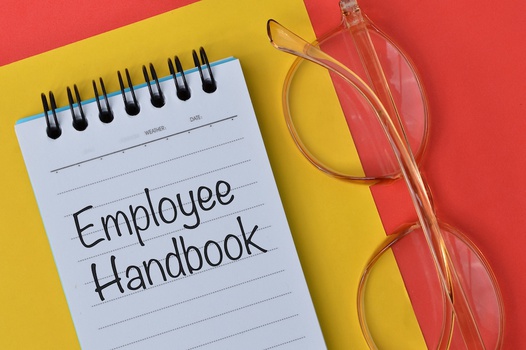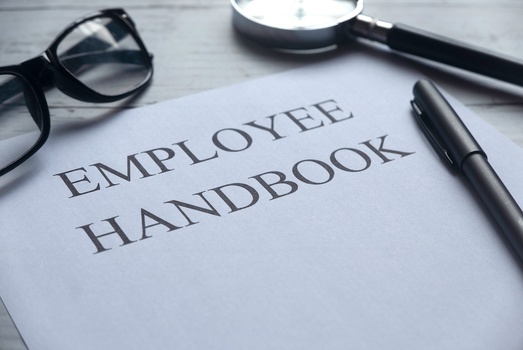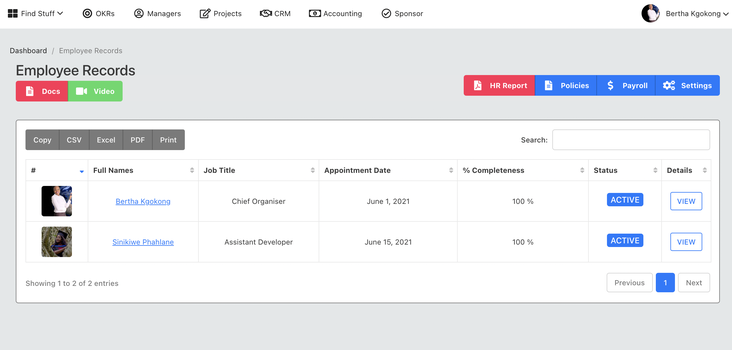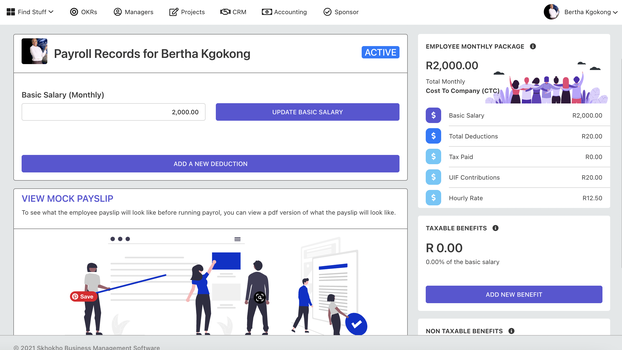Best HR Software for Small Businesses
If you're a small business owner, you know how important it is to find the right top HR software. There are a lot of hr solutions out there, and it can be overwhelming to try to figure out which one is right for you. But don't worry, we're here to help. In this blog post, we'll show you the best HR software for small business.

This blog will mainly focus on the following topics:
- What is Human Resource Management
- Small business Pain Points
- Do small businesses require an HR Management System
- The 7 HR processes
- Choosing the right HR Platform
- Small Business HR Software: Key Features
- Best Payroll systems
- Top Human Resources Software: HR and Payroll

What is Human Resource Management
The strategic approach to managing people in a company or organization effectively and efficiently so that they contribute to their firm's ability to compete favourably is known as human resource management (HRM or HR). It is made to maximize employee engagement and improved employee engagement in support of a company's strategic goals.
Core HR solutions help businesses perform the administrative functions of managing a workforce — payroll processing, benefits administration, time and attendance tracking, workforce planning, and regulatory compliance. The self-service portal — which lets employees access their work-related data and enter updates and requests.
Small Business Pain Points
There are a few specific pain points that small businesses often face when it comes to Human Resource Management. One is simply not having the resources to dedicate to HR tasks. This can lead to things falling through the cracks, or not being dealt with in a timely manner. Another pain point is not having access to the same level of technology and tools that larger businesses do. This can make it difficult to keep up with the latest HR trends and practices.
Small businesses often have a lot of difficulty when it comes to human resources and payroll. This can be a big pain point for business owners, as it can be very time-consuming and frustrating. There are a few things that you can do to try and ease this pain point, however. First, you can try to find a software that can help automate the process.

They may not have the resources or manpower to keep up with all of the latest changes in employment law, or they may simply not have the experience in dealing with these sorts of issues. This can often lead to problems down the line, such as expensive lawsuits or disgruntled employees.
One of the biggest pain points is the lack of flexibility. Many small businesses have inflexible HR policies that make it difficult for employees to balance work and life. This can lead to high levels of stress and burnout. Another pain point is the lack of communication. Small businesses often have poor communication systems in place, which can make it difficult for employees to stay informed about company policies and procedures. This can lead to confusion and frustration.
Running a small business is hard enough, but when it comes to HR policies, things can get even more complicated. Here are some of the most common HR pain points for small businesses:
1. Keep up with the ever-changing laws and regulations.
The laws and regulations surrounding HR are constantly changing, and it can be tough for small businesses to keep up. This can lead to non-compliance and potential penalties.
2. Developing and implementing policies that work for your business.
It's not enough to just have HR policies in place - they need to actually work for your business. This can be a challenge for small businesses, who often don't have the same resources as larger companies.
3. Ensuring that your employees are actually following the policies.
Even if you have great HR policies in place, they won't do any good if your employees aren't following them. This can be a challenge for small businesses, who often don't have the same level of control over their employees as larger companies.

4. Dealing with employee complaints.
Dealing with employee complaints is one of the most challenging parts of being a small business owner. Not only do you have to deal with the complaint itself, but you also have to make sure that you're following all of the relevant laws and regulations.
5. Keeping up with the latest technology.
Technology is always changing, and that means that HR has to change with it. Small businesses often don't have the same resources as larger companies when it comes to keeping up with the latest HR technology.
Do small businesses require HR?
Small businesses may not think they require HR, but HR can actually be a valuable asset to any organization, small or large. HR can help hr managers with a variety of tasks, from new hire and onboarding to benefits administration and compliance. Not to mention, HR can help create a positive work environment and culture. So even though small businesses may not think they need HR, HR can actually be a valuable asset to any organization.

HR can help with payroll and benefits, and compliance with employment laws. HR can also be a resource for employees, providing information on policies and procedures and helping to resolve conflicts. Having an HR department can help a small business run more smoothly and avoid potential legal problems.
Smaller business require HR. Although no dedicated employee is needed, someone must process payroll, find and onboard new employees. HR software helps simplify the whole process. Many tools also provide information about the compliance and employment laws, which are hard for someone who’s not experts. Small businesses must find a product that has the features that their business needs without paying extra costs.
What are the 7 HR processes?
There are 7 processes:
- Recruitment
- Selection
- Training and development
- Performance management
- Compensation and benefits
- Labor relations
- Employee health and safety
Each of these processes is important in its own right, and they all work together to ensure that an organization has the best possible workforce. By taking care of these processes, HR can help to improve organizational performance and make the workplace more enjoyable for everyone involved.
How to choose the right HR Platform?
There are a lot of options out there when it comes to HR software for small businesses. It can be tough to decide which one is right for you when there are many management tools out there. Here are a few things to keep in mind when you're looking for the best HR software for small businesses:

There are many factors to consider when choosing hr system for small:
The size of your company, the industry you're in, and the specific needs of your HR department are all important factors to keep in mind. You'll also want to consider things like ease of use, price, and customer support when making your decision.
To help you narrow down your options, it's a good idea to start by looking at some of the most popular HR software programs on the market. Once you've done some research, you should be able to identify a few programs that would be a good fit for your company. From there, you can contact each vendor to get more information and pricing.
Making the final decision can be tough, but it's important to take your time and choose the right HR software for your business. With the right program in place, you can streamline your HR processes and make your job a whole lot easier.
First, decide what features you need and what your budget is. Then, compare different software programs to see which one best meets your needs and has an affordable base fee per month. Be sure to read online reviews to get an idea of what others think of the software you're considering. Finally, take a free trial of the software to see how it works in person. By following these steps, you can be sure to choose the right HR software for your business.
Small Business HR Software: Key Features
Small businesses do not require an advanced set of HR functions. We look at some popular platforms to see what features are available for core HR functions: recruiting and onboarding, time and attendance, payroll, benefits administration, employee performance and training. Choose an HR solution that meets the requirements of the enterprise. It will enable you to access workforce management capabilities without overpaying.
There are many different payroll software options out there, so do some research and see which one would be the best fit for your business. Another option is to outsource your payroll to a professional service. This can be a bit more expensive, but it can take a lot of the stress and burden off of your shoulders. Whichever route you decide to go, just make sure that you take the time to find a solution that will work best for your business.
Small business HR software typically includes a wide range of features to help businesses manage their data for employees. Some of the key features include:
– Employee personal information:
This feature allows businesses to track employee information such as contact details, job titles, and salary information. The right HR software can provide the boost you need to unlock the benefits of well-managed employees.

– Employee onboarding:
This feature helps businesses onboard new employees by providing them with information about the company, their job duties, and company policies.
– Performance tracking:
This feature helps businesses with time tracking and performance track data such as job satisfaction, productivity, and attendance.
– Time and attendance tracking:
This feature allows businesses to track employee time and attendance data.
– Benefits administration:
This feature helps businesses administer employee benefits such as health insurance, 401k plans, and vacation days.
- Employee self-service:
This allows employees to view and update their own information, freeing up your HR staff for other tasks.
- Leave management:
This allows you to track and manage employee leave.
Small business HR software can be a valuable tool for businesses of all sizes. By using the key features mentioned above, businesses can manage employee data more effectively and efficiently.
Best Payroll systems
For businesses, choosing the best payroll system can save a lot of time and money. The right full service payroll will automate payroll processes and make it easier to manage employee information and payroll processing. There are a few things to consider when choosing a payroll system, such as features, ease of use, and price.
One of the most important features to look for in a payroll system is the ability to automate payroll. This means that the system should be able to calculate payroll taxes and deductions automatically. This can save a lot of time and ensure that payroll is accurate.
Another important feature to consider is ease of use. The HR management system should be easy to set up and use. It should also be easy to update employee information and run reports.
Finally, consider price when choosing a payroll system. The system should be affordable and offer a good value for the features it offers.
Top Human Resources Software: HR and Payroll
There are many HRMS software options on the market, but Skhokho is one of the best hr and payroll software for small businesses. Skhokho offers a comprehensive suite of HR tools that can help your business manage employee data, tracking employee roles and responsibilities, and managing employee benefits (employee directory). Skhokho also offers a robust set of reporting and analytics tools that can help you track your HR data and make better decisions about your employee management.

If you are in the market for a new HR software, you may have heard of Skhokho HRMS. Skhokho HRMS is a top human resources software that is used by many businesses. Skhokho HRMS offers many features that other HR software does not offer. Skhokho HRMS is a cloud-based software, so it can be accessed from anywhere. Skhokho HRMS is a top human resources software because it offers a lot of features that other HR software does not offer.
Skhokho HR Features
This incredible HRMS has the following HR features that supports business HR requirements:
- HR Settings
- HR Policies
- Employee Records
- Payroll Records
Skhokho offers a free trial, go ahead and start your free trial today here: https://skhokho.io/authentication/register
For more information on Skhokho Human Resource software: https://skhokho.io/hr-management-software-for-small-business
Documentation Guide on how to use Skhokho HR App: https://skhokho.io/documentation/guide/
What HR policies should a small business have?
A small business'HR policy should outline these factors such as nonexempt or exempt employee classifications, employment opportunity guidelines, work days, pay time and paydays, pay advances and overtime pay.
Small businesses have a lot on their plate and human resources is often one area that gets neglected. However, having some basic HR policies in place can save a lot of headache down the road. Here are a few HR policies that every small business should consider:
- Employee handbook: This sets out the expectations and rules for employees and can help prevent misunderstandings down the road.
- Performance reviews: Regular performance reviews help to ensure that employees are meeting expectations and can identify any areas that need improvement.

- Disciplinary procedures: Having a clear disciplinary procedure in place will help to ensure that employees are treated fairly and consistently.
- Benefits: Offering some basic benefits, such as health insurance and retirement savings plans, can help to attract and retain good employees.
By taking the time to put some basic HR policies in place, small businesses can save themselves a lot of time and headaches down the road.
Conclusion
There are a few different payroll systems on the market, so take some time to compare them before making a decision. Choose the system that best meets the needs of your business.
As a small business owner, you know that human resources and payroll can be a big pain point. From managing employee records to calculating payroll taxes, there's a lot to keep track of. And if you're not careful, it can be easy to make a mistake.
That's why it's so important to have a good system in place for managing your HR and payroll. Here are a few tips to help you get started:
- Keep good records. This includes everything from employee contact information to their job history.
- Stay up to date on payroll taxes. Make sure you're withholding the right amount from each employee's paycheck.
- Use payroll software. This can help you automate some of the more tedious tasks, like calculating taxes.
By following these tips, you can make HR and payroll a lot easier to manage.









